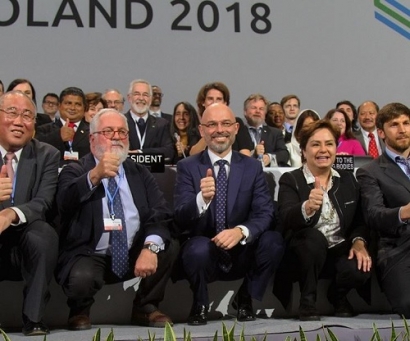
However, in a sign of just how fractious the talks were, the same officials pushed off decisions on two significant issues until next year. They deferred rules on carbon credits and failed to make any firm commitment to strengthen countries' emissions reduction targets by 2020, when many of the promises of the accord are scheduled to come into force.
In announcing the overarching agreement, Michal Kurtyka, the Polish official who chaired this year's talks said the conference delegates have taken "a thousand little steps forward" to achieve consensus on the rules.
He also said while it is likely no one walked away from the conference entirely happy, "We will all have to give in order to gain."
Later, he took to Twitter to declare, "Mission accomplished."
"Our children will look back at our legacy and recognize that we took the right decisions at important junctures like the one we face today," his tweet said.
The meeting in Katowice, Poland - a city in the nation's coal mining region of Silesia - came on the heels of a series of harrowing reports on climate change and its increasingly obvious impacts on how people live and the increasing frequency of natural disasters.
In the United States, the National Climate Assessment, a quadrennial report prepared by government scientists, said climate change will wreak havoc on the U.S. economy by 2100 as weather-related disasters, including hurricanes, droughts and wildfires drain the government and private resources needed to address them.
“The impacts and costs of climate change are already being felt in the United States, and changes in the likelihood or severity of some recent extreme weather events can now be attributed with increasingly higher confidence to human-caused warming,” the assessment says.
Another report, from the Intergovernmental Panel on Climate Change, concluded that while it's possible to cap global warming at 1.5 degrees by the end of the century, this goal can only be achieved with dramatic changes to the global economy.
A proposal to include this assessment in the final report from the climate meeting was the biggest source of tension and controversy at the session.
Several oil-exporting nations, including the United States, Saudi Arabia and Russia, moved to block any endorsement of the IPCC report. This prompted several small island nations to threaten to block any final agreement from the session.
Mohamed Nasheed, the former president of the Maldives, told reporters Friday that the draft agreement then being discussed by the delegates didn't reflect the reality faced by countries like his, which are already under extreme threat from climate change.
"We are deeply unhappy with the way the talks are going," Nasheed said.
In the end, the oil-producing countries prevailed. The final text acknowledges the "timely completion" of the IPCC report, but says nothing of its conclusions.
The meeting text also omits a previous reference to specific reductions in greenhouse gas emissions by 2030.
But the islands did nail down a promise of greater clarity when it comes to funding to help them cut carbon emissions, adapt to sea level rise and other climate-related changes they experience, and pay for damages from catastrophic storms and other worsening natural disasters.
Although the meeting was scheduled to end on Friday other disagreements pushed the talks into the weekend. The biggest was a dispute between Brazil and other Paris accord signatories over how to create a new market for carbon credits that is more transparent than the regime in place now.
A functioning and transparent international trading system for carbon credits is considered a key element in the fight to curb greenhouse gas emissions and raise much needed funds to address the extreme impacts of climate change.
Oddly, given the Trump administration's decision to pull out of the Paris climate deal, it was the United States that pushed for a more transparent international credit trading system.
"Overall, the U.S. role here has been somewhat schizophrenic," said Elliot Diringer of the Center for Climate and Energy Solutions, a Washington think tank, in an interview with the Associated Press
On the one hand, he said, the U.S. has devoted a tremendous amount of energy pushing fossil fuels and coal and rejecting science. On the other, its representatives spent much of their time at the meeting trying to find and close potential loopholes that could allow countries to dodge their commitments to cut emissions.
"The U.S. pushed harder than nearly anyone else for transparency rules that put all countries under the same system, and it's largely succeeded," Diringer told the AP.
This was all the more surprising coming, as it did, the same week that acting National Oceanic and Atmospheric Administration chief Adm. Timothy Gallaudet told reporters at a scientific meeting in Washington, D.C., that he'd never "personally" briefed President Donald Trump on climate change, and didn't know of anybody who did.
Alden Meyer, director at the Union of Concerned Scientists, a non-profit science advocacy group, told the New York Times he felt "political will" was missing at the meeting, but felt in the end that the agreements achieved provide "the hooks for governments, cities, businesses, civil society etc to do the work to get (to the Paris Agreement goals)."
For additional information:
Katowice Climate Change Conference

